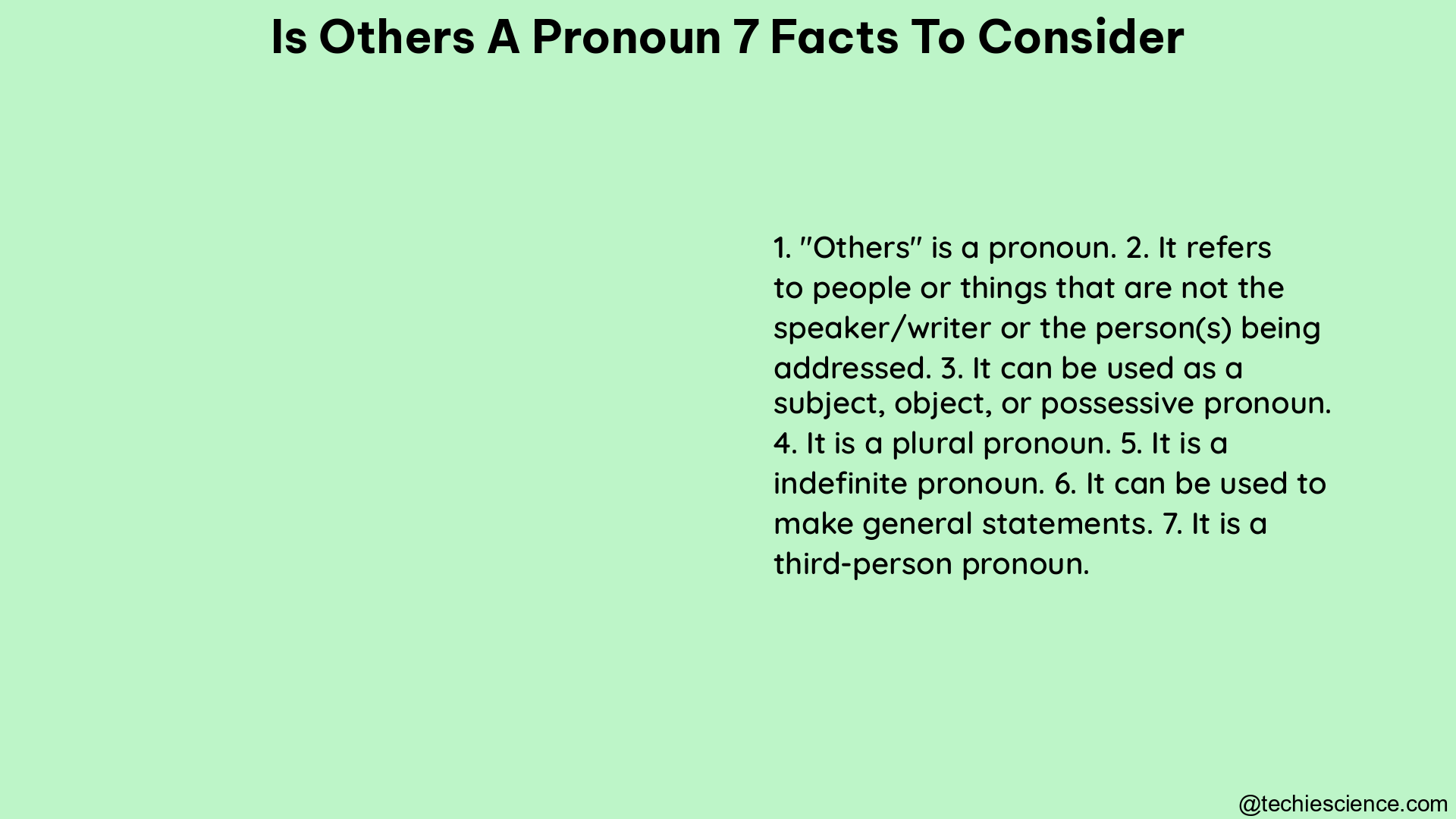The question of whether “others” is a pronoun is a nuanced one, and there are several technical and advanced facts to consider in this comprehensive guide.
Determiner vs. Pronoun
“Others” can function as both a determiner and a pronoun in the English language. When used as a determiner, “others” is employed to describe a noun, such as “other people.” In this case, “others” provides additional information about the noun it modifies.
On the other hand, when “others” is used as a pronoun, it stands alone and refers to a group of people or things without specifying the noun. This distinction is crucial in understanding the grammatical role of “others” in a sentence.
Plural Form

An essential fact to consider is the plural form of “other” when it is used as a pronoun. In this case, the word takes the plural form “others.” This is in contrast to its use as a determiner, where “other” does not have a distinct plural form.
| Usage | Singular | Plural |
|---|---|---|
| Determiner | other | other |
| Pronoun | – | others |
This difference in the plural form helps to differentiate the grammatical function of “others” in a sentence.
Count Interpretation
Another important fact about “others” is its ability to have a count interpretation. When used as a pronoun, “others” can refer to a specific group of people or things that can be counted. This is different from its use as a determiner, where it does not have a count interpretation.
For example, in the sentence “I gave the book to others,” the word “others” has a count interpretation, referring to a specific group of people who received the book. In contrast, in the sentence “I bought other books,” the word “other” as a determiner does not have a count interpretation.
Antecedent
Unlike traditional pronouns, “others” does not require an antecedent noun or phrase to be clear in its meaning. It can stand alone and still convey a specific meaning, referring to a group of people or things without the need for a preceding reference.
This is a unique characteristic of “others” that sets it apart from other pronouns, which typically rely on an antecedent to establish their referent.
Oxford English Dictionary
The authoritative Oxford English Dictionary (OED) recognizes “others” as a pronoun in certain contexts, particularly when it refers to a group of people or things excluding the speaker. This official recognition by a leading dictionary further solidifies the status of “others” as a pronoun in the English language.
Common Noun Sense
In addition to its use as a determiner and a pronoun, “others” can also have a common noun sense. In this case, it refers to a specific group of people or things that can be identified and counted, similar to a common noun.
For example, in the sentence “The others in the group were all wearing hats,” the word “others” functions as a common noun, referring to a specific group of people within the larger context.
Contextual Clarity
The meaning and grammatical function of “others” are heavily dependent on the context in which it is used. The same instance of “others” can have different interpretations depending on the surrounding words, phrases, and the overall context of the sentence or paragraph.
For example, “others” can refer to a specific group of people or things in a particular situation, or it can have a more general meaning, referring to people or things in general.
Understanding the contextual nuances of “others” is crucial in determining its precise grammatical role and meaning in a given context.
In conclusion, the question of whether “others” is a pronoun is a complex one, with several technical and advanced facts to consider. By understanding the determiner vs. pronoun distinction, the plural form, count interpretation, antecedent requirements, dictionary recognition, common noun sense, and the importance of context, you can develop a comprehensive understanding of the grammatical role and usage of “others” in the English language.
References:
– https://ell.stackexchange.com/questions/120949/others-pronoun-or-determiner
– https://dictionary.cambridge.org/us/grammar/british-grammar/other-others-the-other-or-another
– https://www.englishalex.com/post/other-vs-another-differences-uses-and-common-mistakes-audio-reading-included

The lambdageeks.com Core SME Team is a group of experienced subject matter experts from diverse scientific and technical fields including Physics, Chemistry, Technology,Electronics & Electrical Engineering, Automotive, Mechanical Engineering. Our team collaborates to create high-quality, well-researched articles on a wide range of science and technology topics for the lambdageeks.com website.
All Our Senior SME are having more than 7 Years of experience in the respective fields . They are either Working Industry Professionals or assocaited With different Universities. Refer Our Authors Page to get to know About our Core SMEs.